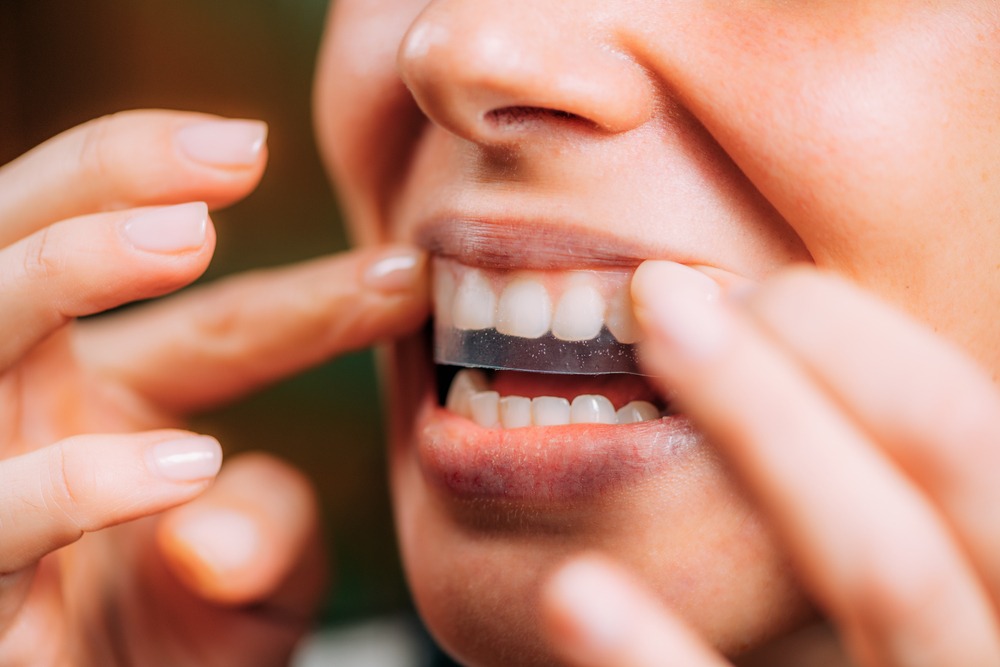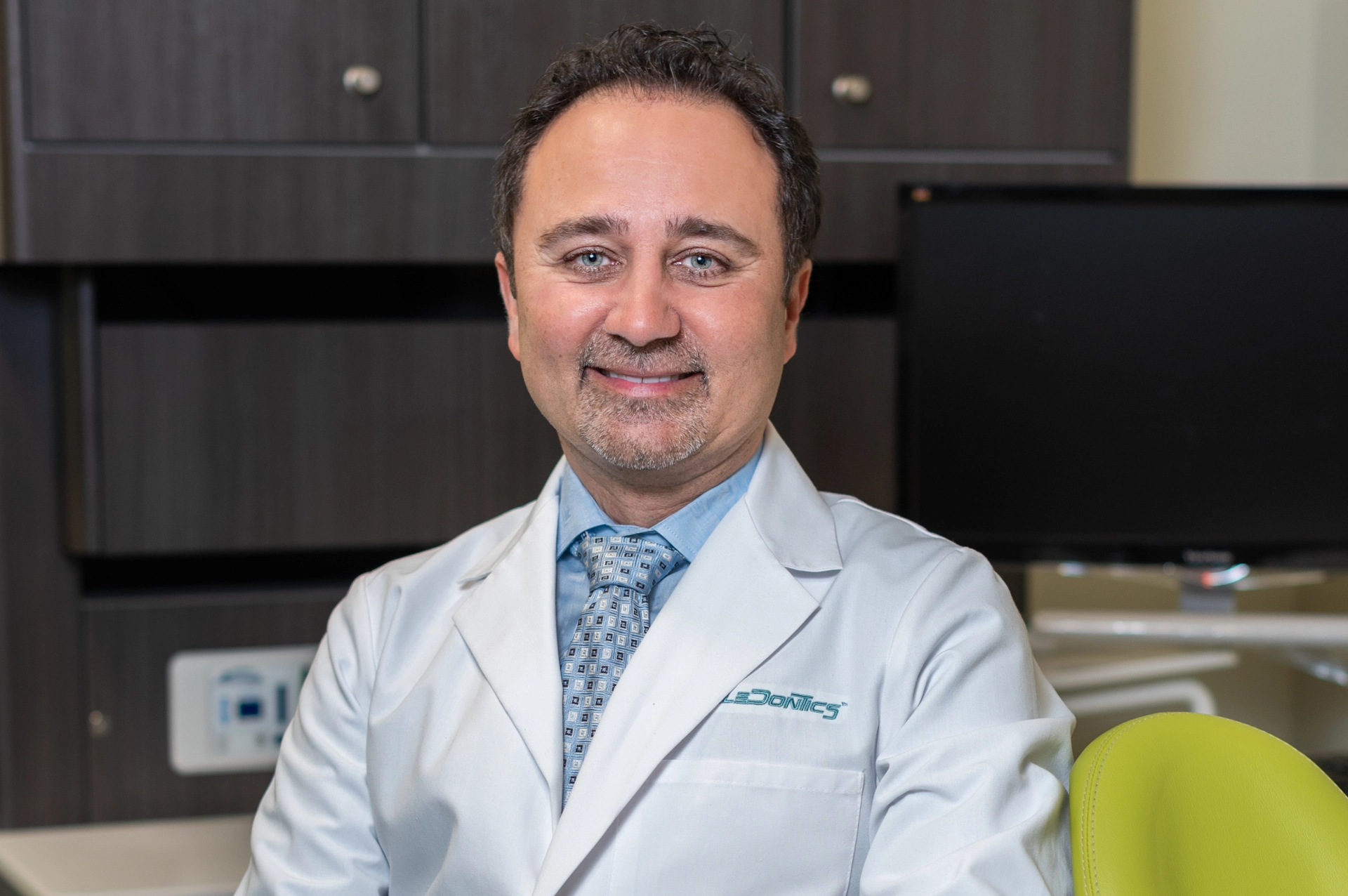
TL;DR:
Does teeth whitening damage enamel? The answer depends on the method and ingredients used. In this blog, Dr. Kami Hoss explains which whitening approaches are safest, which to avoid, and how to protect your enamel while still achieving a brighter smile.
- Enamel is irreplaceable, and certain whitening agents—especially peroxide—can weaken or dehydrate it if misused.
- Nano-hydroxyapatite (nHA) is a safer, enamel-rebuilding alternative to peroxide.
- Whitening strips and LED kits are often unsafe for long-term use because they usually contain peroxide.
- Professional whitening is safest when supervised by a dentist and tailored to your needs.
Strengthen your enamel with remineralizing products and avoid acidic foods during whitening treatments.
Many patients come to see me seeking a brighter, whiter smile. However, some of them are reluctant to try the latest whitening treatments. After all, they don’t want to choose aesthetics over long-term oral health.
Does teeth whitening damage your enamel, or can you enjoy a whiter smile without consequences?
The truth is that teeth whitening should not damage your enamel if it’s done properly and if you choose whitening products carefully. But there’s a big catch. Using the most common whitening agents like hydrogen peroxide CAN your oral health at risk.
In this blog, I will break down the science behind whitening, so keep reading to learn how to safely achieve and maintain a radiant smile without harming your enamel.
Understanding Teeth Enamel and the Effect Whitening Has on It
Enamel is the hard, outer layer of your teeth. It’s what protects your teeth against decay and physical damage. It also prevents sensitivity when eating and chewing. Once enamel wears away, it doesn’t grow back.
Most over the counter teeth whitening products work by using peroxide-based agents to penetrate the enamel. While whitening with peroxide is effective at breaking down stains within the layer beneath your enamel, it can also lead to serious damage to enamel, not to mention gum irritation.
For this reason, I do NOT recommend using peroxide-based whitening products. The risk of irreversible damage to your oral health is simply too great.
Instead, I recommend nano-hydroxyapatite (nHA) as a safe and natural alternative for whitening. Unlike peroxide, nHA is a biomimetic mineral that both whitens and rebuilds (instead of destroys) tooth enamel. It’s capable of restoring smoothness and gently brightening teeth over time.
Does Teeth Whitening Damage Enamel?
It depends. Teeth whitening using peroxide can damage enamel, but teeth whitening via other methods like nany hydroxyapatite is unlikely to damage enamel if:
- You follow product instructions carefully
- You avoid overuse
- You take other steps to promote whole-mouth health and enamel restoration (such as using toothpaste with nanohydroxyapatite and avoid brushing 30 minutes after eating acidic foods or drinking acidic beverages)
The Bottom Line: Whitening formulas that use nano-hydroxyapatite provide a non-toxic, enamel-rebuilding solution that safely enhances brightness while strengthening tooth structure.
Let’s look at some specific approaches to tooth whitening and their safety profiles.
![]()
Do Whitening Strips Damage Teeth?
Most strips contain hydrogen peroxide, which whitens by oxidizing stains. Therefor these types of whitening strips are likely to cause damage to enamel.
Overusing your whitening strips can also dry out the enamel. That can cause a rough tooth texture as well.
If you’re concerned about enamel sensitivity or damage, consider whitening alternatives that feature nano-hydroxyapatite. These formulas work differently than peroxide. They gently fill in surface imperfections while restoring natural whiteness, making them safe for daily or long-term use.
Does Whitening Toothpaste Work?
Yes! Whitening toothpaste made with microbiome-friendly ingredients like hydrated silica, fluoride, and nano-hydroxyapatite are both safe and effective for whitening your teeth. Avoid formulas with peroxide, and charcoal, which are overly harsh on teeth, gums, and enamel.
Is Professional Teeth Whitening Safe?
Yes. Professional teeth whitening is generally safe when performed by a licensed dental provider. Your dentist will carefully control the application of whitening agents, which can minimize the risk to your enamel.
Your dentist might also use desensitizing agents during the procedure. While you might experience temporary sensitivity, however the risk of permanent damage is much lower in a professional setting.
Is LED Teeth Whitening Safe?
Many modern at-home kits now feature LED lights. However, the light itself doesn’t actually whiten your teeth. The light speeds up the chemical reaction of the whitening agent. And in most cases, LED teeth whitening kits use peroxide, which we’ve already established may be effective, but it isn’t safe. Therefore I don’t recommend LED teeth whitening with peroxide whitening agents.
Dr. Hoss’s Tips for Whitening Safely
Here are a few tips from Dr. Kami Hoss on preserving your enamel during whitening treatments:
- Use dentist-approved products with natural, enamel-safe ingredients.
- Follow instructions exactly. Don’t overuse whitening strips or gels.
- Avoid acidic or abrasive foods (like citrus or whitening toothpaste with harsh grit) during whitening periods.
- Strengthen enamel with remineralizing toothpaste that contains hydroxyapatite or fluoride.
- Avoid brushing immediately after whitening, as enamel may be temporarily softened.
- Drink water and rinse often to neutralize acids and wash away stains.
- Maintain regular cleanings to prevent plaque buildup, which can make stains appear worse.
Oral Health Begins With Safe, Well-Formulated Products
Shop dentist-approved oral health products that are made with natural ingredients, safe for your teeth. Find toothpaste, mouthwash, and even toothbrushes for every age. Shop now!

